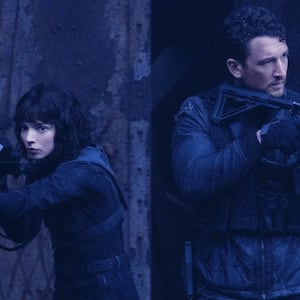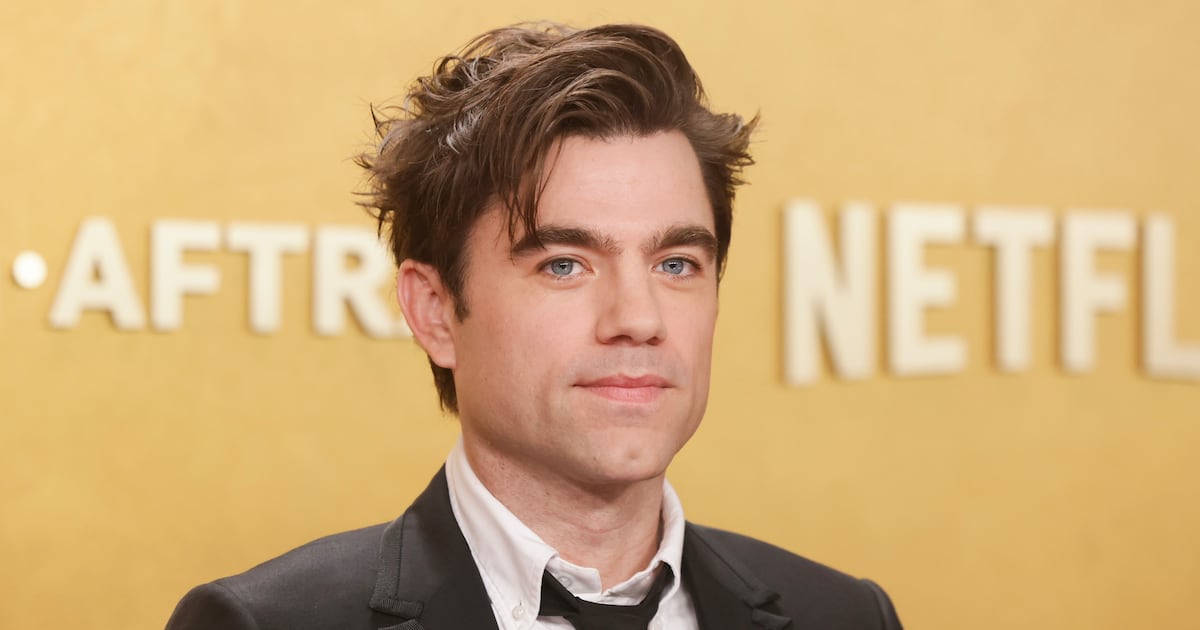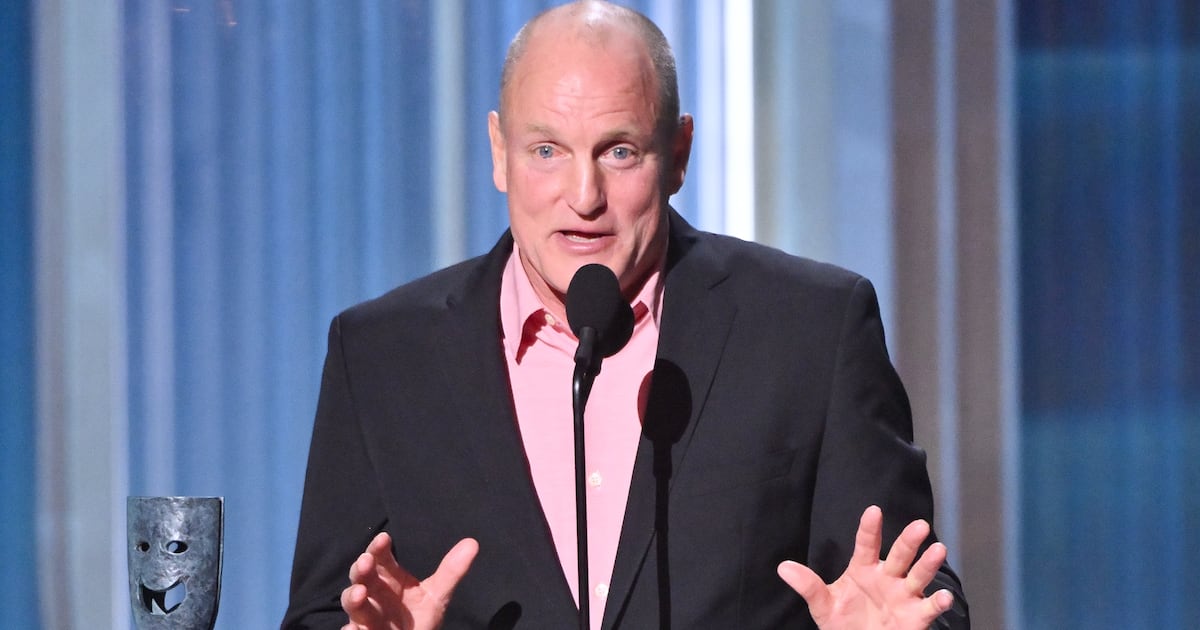Led by Robert De Niro and featuring Angela Bassett, Jesse Plemons, Lizzy Caplan, Joan Allen, Bill Camp, Dan Stevens, Connie Britton, Clark Gregg, Gaby Hoffmann, and Matthew Modine, Zero Day might boast the year’s most impressive cast—and to add to its resumé, it comes from showrunner Eric Newman (Narcos, Narcos: Mexico) and director Lesli Lina Glatter (Homeland, The Walking Dead, Mad Men, and virtually every other big-time television show from the past thirty years). With such bona fides, this six-part Netflix limited series is the definition of prestige TV.
Unfortunately, all the status in the world can’t save it from also being a muddled, labored, suspense-challenged washout.
A conspiratorial cyberthriller that strives in vain for timeliness, Zero Day, which launches Feb. 20, is a frustratingly ungainly A-list affair, at once hurried and sluggish, detailed and disorganized, serious-minded and ridiculous.
Created by Newman, Noah Oppenheim, and Michael Schmidt, it’s a knotty tale of 21st-century warfare that feels simultaneously attuned to the threats and schisms faced by contemporary America, and rooted in outlandish fantasy that undercuts its gravity. Worse, its schizophrenia is married to narrative sloppiness, with corners cut, relationships only partially developed, and twists that strain credulity past a reasonable breaking point. No amount of peerless talent can prevent it from feeling more absurd than urgent.

Former President George Mullen (De Niro) meets at his Hudson, New York, home with writer Anna Sindler (Hannah Gross), who’s been assigned to help him finish his overdue memoir. That project is put on the backburner when, upon leaving, Sindler perishes in a shocking traffic accident caused by a one-minute nationwide electronics-system outage that’s followed by a message sent to every device in the country: “This Will Happen Again.”
Unsurprisingly, the public freaks out, and in the aftermath of this “Day Zero,” current commander-in-chief Evelyn Mitchell (Bassett) decides that the surest way to figure out who was behind this assault is to create a Zero Day Commission invested with limitless unconstitutional powers. To run it, she chooses Mullen, since he left office—after one term, ostensibly to grieve the overdose death of his son—as a revered figure who was the last president to successfully bring Democrats and Republicans together.
Mullen doesn’t really want this historic responsibility and he agrees with his wife Sheila (Joan Allen)—who’s in line to become a high-powered judge—that the risks are great and that President Mitchell is possibly setting him up to be a fall guy should answers not quickly materialize. Mullen’s daughter Alexandra (Lizzy Caplan), a congresswoman at odds with her dad, voices similar concerns.
Nonetheless, he accepts the position and brings with him right-hand man Roger Carlson (Plemons), who’d recently been working in the private sector for financier Robert Lyndon—a titan who’s willing to blackmail and exploit others for personal gain. Additionally joining Mullen on the controversial task force is Carl Otieno (McKinely Belcher III), a justice department agent, Melissa Kornblau (Mozhan Navabi), a PR whiz, and eventually Valerie Whitesell (Connie Britton), his former chief of staff.

Complications soon pile up at a rapid clip, whether it’s Speaker of the House Richard Dreyer (Modine) scheming to oust Mullen with Alexandra’s aid so he can seize control of the committee, CIA Director Lasch (Camp) snooping around the edges of the investigation, social media billionaire Monica Kidder (Hoffmann) tipping the online-discourse scales, or Alex Jones-ish TV blowhard Evan Green (Stevens) railing against the corrupt Mullen.
Zero Day is jam-packed with players and plot threads, but it weaves them together clumsily, such that individuals’ jobs, backgrounds, and connections to each other aren’t always clear. Further clouding things, Mullen seems to be losing his mind, seeing visions of people who aren’t there and hearing the Sex Pistols’ “Who Killed Bambi?” everywhere he goes. Like the United States’ blinking electronic systems, he appears to be on the fritz.
De Niro is both forceful and uncertain in Zero Day, and everyone around him does solid work, even when—as is the case with Plemons—their characters are more a compendium of traits than fully formed creations. The show, however, is too overstuffed and harried to let anything breathe, which is all the more exasperating given that so many of its detours prove to be deflating dead ends.

Until its fifth episode, there’s precious little tension or intrigue, with the proceedings wasting tons of time on Mullen’s screwy head space. Whether speaking to mysterious Israeli contact Natan (Mark Ivanir) or pronouncing things at press conferences that haven’t been conclusively verified, Mullen is a broken-down warhorse in a modern age he doesn’t understand, and the series mistakenly prioritizes watching him grapple with his own cognition over gripping cyber-sleuthing.
Zero Days tackles hot-button topics like civil liberties, torture, and the vulnerabilities of interconnected societies, not to mention greed, corruption, polarization, fanaticism, and the idea that unchecked power—even in the hands of the ostensibly noble—can lead to authoritarianism.
There’s practically no timely box that isn’t checked, and yet most of its of-the-moment talk rings hollow, largely because its story is filled with overly melodramatic (if not outright implausible) developments. Taking aim at various targets (shady government representatives, tech moguls, media disinformation peddlers), it frequently misses the mark. And despite its tale taking place across various states (where violent unrest mounts), it feels small and confined, adding to its listlessness.
Between its endless chitchat about fascism and the truth, and a finale that hinges on a Mullen report (shades of the Mueller report?) in which the crusading protagonist stands up for democracy by exposing the nefarious agents who would warp it for their own selfish ends, Zero Day attempts to speak to our present domestic chaos.
The political madness it delivers, though, gets sillier as the end nears, and Newman falls back on big speeches and honorable sacrifices to wrap things up in relatively comforting fashion. In the process, he squanders at least half of his performers—Camp, in particular, is wasted as the unimportant Director Lasch—and elicits as many eye rolls as gasps. In trying to say something meaningful about today, it simply expresses its fondness for facile, over-the-top make-believe.









